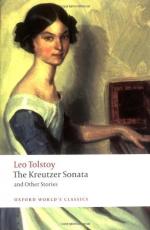|
This section contains 1,555 words (approx. 6 pages at 300 words per page) |

|
SOURCE: "The Nouvelle as Hypothesis," in his Tolstoy and the Novel, Chatto & Windus, 1966, pp. 281-93.
In the excerpt below, Bayley contrasts Pozdnyshev's views about marriage expressed in The Kreutzer Sonata with those of Tolstoy.
If one married, along what lines might the relation proceed? What would happen if one became murderously jealous, or obsessed with desire for another woman? Suppose one were to contract a fatal and painful disease, or gave up the world to become a monk and hermit? These hypotheses are specialised; they depend on the rest of life being left out, so that we can concentrate on one particular possibility and problem. Yet all ask the question which is implicit in all Tolstoy's fictions: how should a man live?
Only one hypothesis became a fact for Tolstoy. He got married, and in some ways his married life resembled his forecast. Yet even Family Happiness . . . remains...
|
This section contains 1,555 words (approx. 6 pages at 300 words per page) |

|


